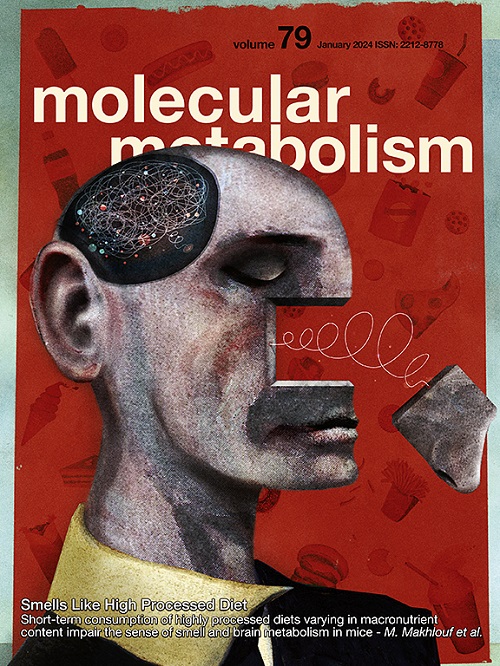Epigenetic suppression of creatine kinase B in adipocytes links endoplasmic reticulum stress to obesity-associated inflammation
IF 7
2区 医学
Q1 ENDOCRINOLOGY & METABOLISM
引用次数: 0
Abstract
In white adipose tissue, disturbed creatine metabolism through reduced creatine kinase B (CKB) transcription contributes to obesity-related inflammation. However, the mechanisms regulating CKB expression in human white adipocytes remain unclear. By screening conditions perturbed in obesity, we identified endoplasmic reticulum (ER) stress as a key suppressor of CKB transcription across multiple cell types. Through follow-up studies, we found that ER stress through the IRE1–XBP1s pathway, promotes CKB promoter methylation via the methyltransferase DNMT3A. This epigenetic change represses CKB transcription, shifting metabolism towards glycolysis and increasing the production of the pro-inflammatory chemokine CCL2. We validated our findings in vivo, demonstrating that individuals living with obesity show an inverse relationship between CKB expression and promoter methylation in white adipocytes, along with elevated CCL2 secretion. Overall, our study uncovers a regulatory axis where ER stress drives inflammation in obesity by reducing CKB abundance, and consequently altering the bioenergetic state of the cell.
脂肪细胞中肌酸激酶 B 的表观遗传抑制将内质网应激与肥胖相关性炎症联系起来。
在白色脂肪组织中,肌酸激酶 B(CKB)转录减少导致肌酸代谢紊乱,从而引发与肥胖相关的炎症。然而,人类白色脂肪细胞中 CKB 表达的调节机制仍不清楚。通过筛选肥胖症的相关条件,我们发现内质网(ER)应激是多种细胞类型中 CKB 转录的关键抑制因子。通过后续研究,我们发现ER应激通过IRE1-XBP1s途径,通过甲基转移酶DNMT3A促进CKB启动子甲基化。这种表观遗传变化抑制了 CKB 的转录,使新陈代谢转向糖酵解,增加了促炎趋化因子 CCL2 的产生。我们在体内验证了我们的发现,结果表明肥胖症患者的白色脂肪细胞中 CKB 表达与启动子甲基化之间呈反比关系,同时 CCL2 分泌增加。总之,我们的研究发现了一个调节轴,在这个轴上,ER应激通过降低CKB的丰度来驱动肥胖症中的炎症,从而改变细胞的生物能状态。(150字)。
本文章由计算机程序翻译,如有差异,请以英文原文为准。
求助全文
约1分钟内获得全文
求助全文
来源期刊

Molecular Metabolism
ENDOCRINOLOGY & METABOLISM-
CiteScore
14.50
自引率
2.50%
发文量
219
审稿时长
43 days
期刊介绍:
Molecular Metabolism is a leading journal dedicated to sharing groundbreaking discoveries in the field of energy homeostasis and the underlying factors of metabolic disorders. These disorders include obesity, diabetes, cardiovascular disease, and cancer. Our journal focuses on publishing research driven by hypotheses and conducted to the highest standards, aiming to provide a mechanistic understanding of energy homeostasis-related behavior, physiology, and dysfunction.
We promote interdisciplinary science, covering a broad range of approaches from molecules to humans throughout the lifespan. Our goal is to contribute to transformative research in metabolism, which has the potential to revolutionize the field. By enabling progress in the prognosis, prevention, and ultimately the cure of metabolic disorders and their long-term complications, our journal seeks to better the future of health and well-being.
 求助内容:
求助内容: 应助结果提醒方式:
应助结果提醒方式:


